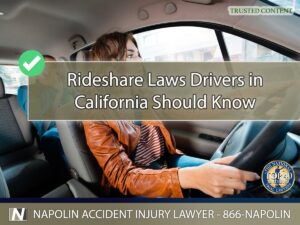Rideshare Laws Drivers in Ontario, California Should Know
In the bustling streets of southern California, ridesharing has become a staple of daily transportation for millions. As services like Uber and Lyft integrate deeper into our transport ecosystem, understanding the legislative landscape governing these services is crucial. This guide aims to demystify the complexities of rideshare laws in California, offering clarity and vital information for both riders and legal professionals navigating this evolving space.

Legal Requirements for Rideshare Companies in California
Legal Requirements for Rideshare Companies in California
California mandates stringent requirements for rideshare companies to safeguard passengers, drivers, and the public. Firstly, all rideshare drivers must undergo a comprehensive background check, which includes scrutiny of their driving history and a criminal record examination. Secondly, rideshare vehicles must meet specific safety and operational standards, ensuring a reliable service for users. Additionally, California law requires rideshare companies to carry substantial insurance coverage to handle any incidents, providing a financial safety net for both passengers and drivers in the event of accidents.
Rideshare companies provide coverage that applies during different phases of a driver's activity. When a driver is waiting for a ride request, a different level of coverage applies compared to when a passenger is actually in the vehicle. Understanding these distinctions is vital for anyone involved in a rideshare accident, as it determines how claims are processed and what compensations might be available.
Rideshare Accidents: Rights and Remedies
Accidents involving rideshares can be complicated, given the multi-layered relationships between companies, drivers, and passengers. In the unfortunate event of an accident, passengers are entitled to compensation for injuries and damages. The key is understanding your rights under California law, which allows victims of rideshare accidents to pursue claims against both the driver and the rideshare company, depending on the circumstances of the accident.
The Rideshare Driver Debate: Employee vs. Independent Contractor
The legal classification of rideshare drivers in California has been a hot topic, significantly affecting claims and liability in accidents. Historically, rideshare companies labeled drivers as independent contractors, limiting their liability and benefits. However, some are pushing to classify these drivers as employees, potentially increasing the companies' accountability. This shift would be crucial for accident claims, as it influences who is responsible for damages and benefits in the event of a mishap.
Steps to Take Following a Rideshare Accident
If involved in a rideshare accident, taking the right steps immediately afterward can significantly impact the outcome of any legal claims. Here are essential actions to consider:
- Ensure Safety: Check for injuries and ensure all parties are safe.
- Notify Authorities: Contact the police to file a report for the accident.
- Gather Information: Collect driver details, vehicle information, and insurance data.
- Document the Scene: Take photos of the accident scene, damages, and any visible injuries.
- Seek Medical Attention: Even if injuries seem minor, a professional evaluation is crucial.
- Contact a Lawyer: Consulting with a legal expert can help protect your rights and ensure you receive appropriate compensation.
Adhering to these steps not only secures your safety but also strengthens your legal standing, should you decide to pursue claims for any injuries or losses.

Navigating the Rideshare Accident Claims Process
Navigating the Rideshare Accident Claims Process
Understanding how to navigate the insurance claims process after a rideshare accident is critical for ensuring that your rights are fully protected. The steps involved can be complex, especially when dealing with multiple insurance carriers and regulatory nuances specific to California. Here's how to effectively manage this process:
- Immediate Reporting: Report the accident to the rideshare company as soon as possible using their dedicated app or customer service number.
- Insurance Notification: Inform your personal insurance provider and ensure that the accident is also reported to the rideshare company's insurer, as both policies may cover different aspects of the incident.
- Detailed Documentation: Collect and submit all necessary documentation, which includes the official police report, detailed medical records if injuries occurred, and photographs or videos from the accident scene.
- Professional Assessment: The insurance companies involved will assess the damages and injuries reported to determine liability and compensation. This process may include physical inspections of the damage, medical assessments of the injuries, and interviews with any witnesses.
- Review of Settlement Offers: Once the assessments are completed, the insurance companies will propose a settlement. It is vital to review this offer with a legal expert to ensure that it adequately covers all damages and injuries without forfeiting any potential compensation.
This structured approach helps ensure that you are adequately prepared to navigate the claims process, aiming for the most favorable outcome.
How Proposition 22 Affects Rideshare Drivers in California
Proposition 22, a significant legislative measure in California, has redefined compensation models for rideshare drivers by setting specific minimum earnings thresholds and providing new benefits structures. This initiative guarantees that drivers earn at least 120% of the minimum wage for the actual time they spend driving—excluding the time spent waiting for a ride request. Additionally, Proposition 22 introduces a health care stipend for eligible drivers. This stipend is scaled based on the average hours per week, providing more substantial health contributions to those who drive more.
Furthermore, Prop 22 mandates that rideshare companies provide occupational accident insurance to cover on-the-job injuries. This insurance must include disability payments capped at 66% of a driver's weekly earnings based on their last four weeks of engaged driving before the injury, from all network companies. This coverage ensures that drivers have a safety net, addressing one of the critical gaps faced by gig economy workers previously classified as independent contractors without access to traditional employee benefits.
These changes under Proposition 22 aim to balance flexibility desired by drivers with the economic security and benefits typically associated with traditional employment, reflecting a shift in how gig economy workers are supported in California.

Rideshare Laws Drivers in Ontario, California Should Know
Rideshare Laws Drivers in Ontario, California Should Know
As a resident of southern California, or even a visitor who has experienced a rideshare accident, understanding your legal rights and the complexities of related laws is paramount. At Napolin Accident Injury Lawyer, we are dedicated to supporting victims of rideshare accidents with comprehensive legal services aimed at securing the justice and compensation they deserve. With extensive experience in litigation related to rideshare accidents and a deep understanding of California transportation and insurance laws, our team is exceptionally qualified to handle these complex cases.
If you or a loved one have been involved in a rideshare accident near the Inland Empire, reach out to us today at (909) 962-8415 for a free consultation. Taking action promptly can significantly influence the outcome of your case, ensuring that you receive the maximum compensation possible. At Napolin Accident Injury Lawyer, we are here to help you navigate through this challenging time with expertise and compassion, advocating fiercely for your rights.
